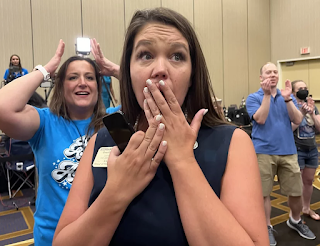Abortion-rights supporters encouraged by Kansas voters’ rejection of anti-abortion measure similar to one on Kentucky’s Nov. 8 ballot

Kansas state Rep. Stephanie Clayton and other abortion-rights supporters were surprised. (Photo: Danielle Kurtzleben, NPR)
—–
By Al Cross
Kentucky Health News
Voters in a Kansas referendum Tuesday maintained a right to abortion in the state constitution, encouraging opponents of a broad anti-abortion amendment on Kentucky’s Nov. 8 ballot.
The Kansas measure would have nullified a 2019 court decision that said the state’s constitution guaranteed a right to abortion. Voters rejected it by 61% to 39% in unofficial returns.
The Kentucky ballot has a proposed constitutional amendment designed to thwart a similar decision that could stem from a lawsuit that is moving through Kentucky courts. It would say that the Kentucky Constitution does not create a right to abortion or government funding of it.
Democratic Gov. Andy Beshear has come out against the amendment, noting that it includes no exceptions for rape or incest. Beshear generally favors abortion rights, but the rape and incest exceptions are popular.
The lopsided Kansas vote was a surprise, and was welcomed by abortion-rights supporters such as Laphonza Butler, president of EMILY’s List, which supports female candidates who support the right.
“Make no mistake, abortion is on the ballot across the country in November, and voters will be holding Republicans accountable for their efforts to strip us of our rights — the success of blocking this anti-abortion ballot initiative is proof of that,” Butler said.
The Kansas City Star reports, “The movement against the amendment succeeded in turning a wide swath of no voters out, despite the amendment’s placement on a primary ballot many assumed would favor Republicans. They were able to keep margins in rural counties smaller than anticipated.”
Kansas voters may have been confused by their oddly worded amendment, and voters unsure about a proposal are more likely to reject it.
The Kentucky measure is more straightforward. It was put on the ballot by the state legislature, through a bill sponsored by Republican Rep. Joseph Fischer, who is challenging Justice Michelle Keller, a registered independent, in an officially nonpartisan race for Northern Kentucky’s state Supreme Court seat.
The state Supreme Court is already dealing with procedural issues in a lawsuit that could prompt it to render a decision like the high court in Kansas. It involves two state laws, one that bans abortion after six weeks and the “trigger law” written to ban almost all abortions if the U.S. Supreme Court overturned its 1973 Roe v. Wade decision, which it did June 24.
Jefferson Circuit Judge Mitch Perry largely accepted the legal arguments of Kentucky’s two abortion clinics, both in Louisville, that the laws violate rights to privacy and religious freedom implicitly created by the state constitution.
Perry issued an injunction blocking enforcement of the laws, but Republican Attorney General Daniel Cameron got Court of Appeals Judge Larry Thompson of Pikeville to block Perry’s order pending the appeals court’s consideration of the case, beginning with a motion to send it straight to the state Supreme Court. That made abortion illegal in Kentucky, at least temporarily, except when needed to save the life of the woman or prevent a serious, permanent disability to a life-sustaining organ.